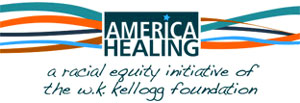Long-term effects of systemic racism examined
By Nisa Islam Muhammad -Staff Writer- | Last updated: May 21, 2010 - 3:58:24 PMWhat's your opinion on this article?
$75 million being used to launch initiative combating inequity
WASHINGTON, D.C. (FinalCall.com) - “Racism continues to affect every area of Black life from education, to health care, to employment, to housing and the problems are not getting any better,” Dr. David Williams, Florence and Laura Norman, Professor of Public Health, Harvard University told The Final Call.

|
“For example, as a mother's education increases infant mortality goes down. However, the best of Black women (with higher education) still do worse than the worst of White women (with lower education),” he said. “It is easier for a White male with a criminal record (felony conviction) to get a job than a Black man with a clean record and they have identical resumes.”
In an unprecedented effort to address the devastating impact of racial inequities on communities across the country, the Kellogg Foundation aims to improve life outcomes for vulnerable children and their families by promoting racial healing and eliminating barriers to opportunities.
Children of color dominate the 29 million low-income children and families in America, particularly among families living in concentrated poverty.
According to data from the National Center for Children in Poverty, about 61 percent of Black, 62 percent of Latino, 57 percent of Native American, 58 percent of children with immigrant parents, 30 percent of Asian American children and 26 percent of White children live in low-income families.
“The Kellogg Foundation's vision is for a nation to marshal its resources to ensure that all children in America have an equitable and promising future,” said Sterling K. Speirn, president and CEO.
“That is simply not the case in many communities across the country today. The goal of the America Healing initiative is to help make that vision a reality by engaging communities and supporting them in the hard work of racial healing and addressing the effects of historic and contemporary structural issues, such as residential segregation and concentrated poverty.”
One thousand applicants responded to the Kellogg Foundation's request for proposals last year. One hundred nineteen organizations representing 29 states and D.C. were selected to receive grants totaling $14,613,709 specifically to support community-based organizations' healing efforts among racial and ethnic groups that address historic burdens, disparities and barriers to opportunity.
“The mission of the W.K. Kellogg Foundation is to help communities create conditions that propel vulnerable children to succeed as individuals and as contributors to the larger community and society,” said Dr. Gail Christopher, vice president of programs.
“Because children of color are so disproportionately represented in low-income families and impoverished communities, realizing our mission requires addressing historic and current structural barriers to opportunity, such as exposure to environmental toxins and under-resourced schools, which are a direct result of past policies and practices of racialization and privilege.”
The initiative will also seek to curtail racism in the media, the environment, education, housing, health and criminal justice systems, with an emphasis on expanding opportunities for all children.
“At a time when our nation shows disturbing signs of becoming more polarized, this courageous effort by the W.K. Kellogg Foundation to promote healing within local communities is sorely needed,” said Con. John Lewis (D-Ga.), at the launch event.
“It reminds us of our true democratic ideals as a nation and of the inalienable rights guaranteed by our founding documents to the free and unfettered opportunity that every human being deserves.”
Grantees include, The People's Grocery, a community organization in West Oakland, Ca. that is organizing low-income people from multiple racial groups to work together to build a local food system that provides greater access to fresh produce and nutrition education.
“Segregation is a lack of access to fresh and healthy foods. The People's Grocery has made progress to stop this. We have our own food distribution network,” explained Nicole Henderson. “Black mothers are teaching our people how to cook and spread our culture. We hold healing arms around them and let them do their work.”
In Minnesota, the Saint Paul Foundation will receive funding to build on its track record in the area of promoting diversity and inclusiveness with programs such as Facing Race, a multi-year campaign to give individuals an opportunity to talk about racial issues and work toward changing the nature of personal, organizational and institutional relationships.
The National Indian Child Welfare Association will receive funding to help Native American families and children heal the wounds from the decades-old policy of removing Native American children from their tribal people.
“This is a matter of life and death,” said Dr. Christopher. “We must be a full and vibrant nation. We have to put childish, stupid, ignorant beliefs behind us. This is about compassion.”
INSIDE STORIES AND REVIEWS
-
-
About Harriett ... and the Negro Hollywood Road Show
By Rabiah Muhammad, Guest Columnist » Full Story -
Skepticism greets Jay-Z, NFL talk of inspiring change
By Bryan 18X Crawford and Richard B. Muhammad The Final Call Newspaper @TheFinalCall » Full Story -
The painful problem of Black girls and suicide
By Charlene Muhammad -National Correspondent- » Full Story -
Exploitation of Innocence - Report: Perceptions, policies hurting Black girls
By Charlene Muhammad -National Correspondent- » Full Story -
Big Ballin: Big ideas fuel a father’s Big Baller Brand and brash business sense
By Bryan Crawford -Contributing Writer- » Full Story






 Click Here Stay Connected!
Click Here Stay Connected!








